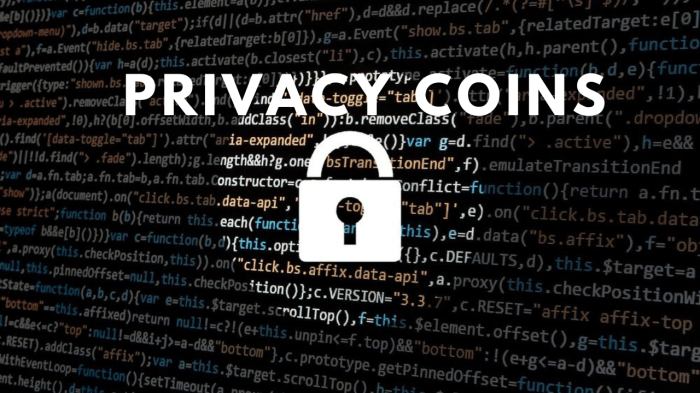Privacy coins take center stage in the world of cryptocurrency, providing a secure haven for your financial transactions. Dive into the realm of anonymity and protection as we explore the ins and outs of privacy coins in this high school hip style narrative.
From unraveling the technology that shields user identities to uncovering the real-world advantages, get ready for a rollercoaster ride through the world of privacy coins.
Introduction to Privacy Coins
Privacy coins are a type of cryptocurrency that focus on providing users with enhanced privacy and anonymity when conducting financial transactions. In a world where data privacy is increasingly important, privacy coins offer a solution to the lack of anonymity in traditional financial systems.
Importance of Privacy in Financial Transactions
Privacy in financial transactions is crucial for protecting sensitive information such as personal identities, transaction amounts, and spending habits. Without privacy, individuals are at risk of having their financial activities tracked and monitored by third parties, leading to potential security breaches and invasions of privacy.
- Privacy coins use advanced cryptographic techniques to obfuscate transaction details, making it difficult for outside parties to trace the flow of funds.
- By enhancing privacy, privacy coins empower users to have full control over their financial information and transactions, reducing the risk of identity theft and financial fraud.
- Privacy coins also promote financial freedom by allowing users to transact securely without the fear of their transaction history being exposed to the public.
Popular Privacy Coins
Privacy coins are gaining popularity in the cryptocurrency market due to their focus on anonymity and security. Let’s take a look at some of the most well-known privacy coins and compare their features.
Monero (XMR)
Monero is one of the leading privacy coins known for its strong privacy features. It uses ring signatures, stealth addresses, and confidential transactions to obfuscate the sender, receiver, and transaction amount. Monero has a large and active community supporting its development.
Zcash (ZEC)
Zcash is another popular privacy coin that offers both transparent and shielded transactions. Users can choose to send transactions publicly on the blockchain or opt for fully shielded transactions that hide the sender, receiver, and amount. Zcash uses zero-knowledge proofs to ensure privacy.
Dash (DASH)
While not solely focused on privacy, Dash offers optional privacy features through its PrivateSend feature. Users can mix their funds with others in the network to obfuscate the transaction trail. Dash also has a strong focus on user experience and fast transactions.
Market Capitalization and Adoption Rates
Monero currently has one of the highest market capitalizations among privacy coins, followed closely by Zcash. However, Dash also has a significant market presence due to its broader use cases beyond privacy. In terms of adoption rates, Monero is widely accepted on various darknet markets, while Zcash and Dash are gaining traction in mainstream use.
Benefits of Using Privacy Coins

Using privacy coins for transactions offers several advantages, including enhanced financial privacy and security. These coins provide users with a level of anonymity and confidentiality that traditional cryptocurrencies lack, making them a popular choice for those seeking to protect their financial information.
Protection of Personal Data
Privacy coins like Monero and Zcash use advanced cryptographic techniques to conceal the sender, recipient, and transaction amount, ensuring that users can make payments without exposing their personal data. This feature is particularly beneficial for individuals who value their privacy and want to keep their financial transactions confidential.
Enhanced Security, Privacy coins
Privacy coins offer increased security by utilizing privacy-enhancing technologies such as ring signatures, stealth addresses, and zero-knowledge proofs. These features make it difficult for malicious actors to trace transactions back to their origins, reducing the risk of fraud, identity theft, and other cybercrimes.
Protection Against Surveillance
In an era of increasing surveillance and data collection, privacy coins provide a means for individuals to conduct transactions without being monitored or tracked by third parties. This can be especially useful for individuals living in countries with strict financial regulations or oppressive governments, allowing them to maintain their financial freedom and autonomy.
Use Cases in Everyday Transactions
Privacy coins are not just for illicit activities; they have legitimate use cases in everyday transactions. For example, individuals may choose to use privacy coins when making online purchases to protect their sensitive financial information from being exposed to hackers or data breaches. Additionally, privacy coins can be used to send remittances or donations without revealing personal details to the public.
Challenges and Criticisms of Privacy Coins
Privacy coins face various challenges and criticisms in the cryptocurrency space due to their unique characteristics.
Regulatory Hurdles
Privacy coins often encounter regulatory challenges as governments and financial authorities seek to monitor and regulate transactions to prevent illegal activities such as money laundering and terrorist financing. The anonymity provided by privacy coins makes it difficult for regulators to track and trace transactions, leading to concerns about their misuse.
Potential for Illegal Activities
Critics argue that privacy coins can be used for illicit purposes, including money laundering, tax evasion, and other criminal activities, due to the enhanced privacy features that shield users’ identities and transaction details. This has raised concerns among law enforcement agencies and policymakers about the potential risks associated with the untraceable nature of privacy coin transactions.
Impact on Traditional Financial Systems
The growing popularity of privacy coins poses a challenge to traditional financial systems and government authorities, as they disrupt the established norms of transparency and accountability in financial transactions. Privacy coins enable users to bypass traditional banking systems, which could lead to a loss of control and oversight by central authorities, impacting the stability of the financial ecosystem.
Future Trends in Privacy Coins

The future of privacy coins in the cryptocurrency market looks promising as more individuals and businesses recognize the importance of financial privacy. With the increasing demand for secure and private transactions, privacy coins are expected to continue growing in popularity.
Innovations in Privacy Coin Technology
Privacy coin projects are constantly working on improving their technology to enhance user privacy and security. Innovations such as zero-knowledge proofs, ring signatures, and stealth addresses are being implemented to make transactions even more anonymous and untraceable.
- Zero-Knowledge Proofs: This cryptographic technique allows for the verification of transactions without revealing any sensitive information, providing a high level of privacy.
- Ring Signatures: By mixing a user’s transaction with others, ring signatures make it difficult to trace the origin of a transaction, ensuring anonymity.
- Stealth Addresses: These addresses generate a new public address for each transaction, making it challenging to link transactions to a specific user.
Regulatory Impact on Privacy Coins
The regulatory landscape surrounding privacy coins is still evolving, with some governments expressing concerns about their potential use in illicit activities. However, as privacy becomes a growing concern for individuals and businesses, regulators may need to find a balance between privacy and compliance.
It is essential for regulators to understand the benefits of privacy coins in protecting sensitive financial information while also addressing potential risks associated with anonymity.
- Regulatory Clarity: Clear guidelines and regulations regarding the use of privacy coins can provide more certainty for investors and users, fostering mainstream adoption.
- Increased Adoption: As awareness of privacy issues grows, more individuals and businesses may turn to privacy coins for secure and private transactions, driving their adoption in the future.
- Technological Evolution: With ongoing advancements in privacy coin technology, the future holds the potential for even more secure and private transactions, attracting a wider user base.
